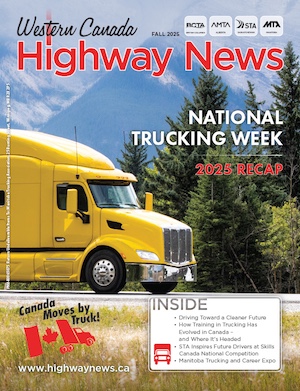By the Saskatchewan Trucking Association
As North American and International supply chains come to a grinding halt, the trucking industry is once again is making headlines across the world and bringing attention to the industry’s longstanding challenge: the driver shortage.
In Europe, a severe driver shortage with research suggesting a shortfall of 400,000 truck drivers has created chaos in places like the United Kingdom, as people rush to secure limited resources like gasoline.
In the United States, the American Transportation Research Institute’s Critical Issues in the Trucking Industry – 2020 survey cited the driver shortage as the top issue the industry faces for a fourth consecutive year. The American Trucking Association has also announced a shortage of 80,000 drivers today, with projections as high as 160,000 by 2030.
In the True North Strong and Free, driver shortage projections also cast a feeling of uncertainty. Between 2021-2025, projections forecast an average of 17,320 truck driver vacancies in Canada per year. Truck driver vacancies only paint part of the picture though. Vacancies could climb as high as 28,000 jobs per year if you include the numerous other occupations in trucking and logistics.
Looking at exit rates in the driver’s seat, Trucking HR Canada’s October Snapshot indicates that while the labour pool is shrinking – the shortage is growing. In Saskatchewan, COVID-19 has put stress on the industry in many ways and has exacerbated labour challenges in our industry, including the fast-tracking of retirements for many drivers at the end of their career. With the historical inability to attract youth to the industry, employers in the province have every right to be worried about their business.
Speaking of business, COVID-19 is proving to be a real threat to trucking’s labour woes. A recent article from the Canadian Trucking Alliance conservatively estimates roughly 20% of Canadian truck drivers crossing the border (22,000) and 40% of U.S. drivers would almost immediately exit the Canada-U.S. trade system if the United States implement a mandatory vaccine mandate for all people crossing the border, regardless of why.
Come January 2022, trucking might look radically different. What must be done to help ease these pressures on the supply chain? At the Saskatchewan Trucking Association, we are embarking on important work with various stakeholders and community partners to spread the word: we’re open for business!
On November 1, 2021, the STA, along with our partner the YWCA of Saskatoon, launched the second cohort of Women Shifting Gears – a program designed to empower women, develop their skills, and provide opportunity to enter Saskatchewan’s trucking industry. This program is supported by the Government of Saskatchewan and aims to fill important labour needs in trucking. As only 3.5% of truck drivers identify as female, Women Shifting Gears is helping shape the future of women in trucking.
Tackling the issues also means working and maintaining a strong relationship with the Government of Saskatchewan. For the past three years, the STA and Ministry of Immigration and Career Training have regularly met to discuss how to best support labour needs in trucking. Currently, our organizations are working with STA members to identify mission critical jobs in trucking and how to attract the next generation of workers. It is clear to us – the STA has been heard.
The STA has also made it a priority to reach other audiences in our community to talk about careers in trucking and the urgent need for drivers. The File Hills Qu’Appelle Tribal Council (FHQ), which represents 11 Member Nations, is working towards submitting a funding proposal for Class 1A funding. FHQ has also hosted the STA in Fort Qu’Appelle. Saskatchewan for a presentation to numerous employment councillors about the industry.
The grassroots work that the STA has embarked on will take time. From educating government and community organizations, to promoting trucking as a career, and ensuring trucking is a welcoming and inclusive place to work, our work is only just beginning.
As the chaos continues in trucking, as supply chains continue to halt, and employers continue to experience a significant shortage of workers, the work we are undertaking – ensuring a sustainable future for trucking – is incredibly important. It’s also possible because we have so much to offer! From seeing the world to driving the economy and fostering a better environment for future generations, this is an industry that has worked tirelessly to shed its negative image and show Canada how trucking can benefit you!
Although the professional driver occupation has so many benefits to offer, at the end of the day, it’s up to employers in Saskatchewan and Canada to make necessary changes and/or adapt to the changing times. Employers looking to attract young talent, or employers who have struggled to in the past, may need to reconsider the way they recruit. Have you tried social media? What about taking advantage of your Provincial Association Job Board? Continuing to operate via traditional methods may not be as effective.
Saskatchewan has historically trended higher for voluntary turnover rates in trucking – sitting at roughly 17% as early as 2019; meanwhile, the Canadian average hovered close to 13%. Simply put, if you can’t retain your drivers and other staff, companies using progressive practices and have a strong company culture will be the benefactors of the limited labour we have.
In the meantime, the driver shortage will continue to persist and likely remain firmly in the headlines. The industry will need to capitalize when young, entry-level drivers express interest in a career as a professional driver. For any trucking company, safety is top of mind – as it should. Hiring an entry-level driver, however, does not have to jeopardize the safety of your fleet. For our industry to succeed into the future, employers should recognize the importance of additional training and skills development. Whether its team driving, or working with an experienced driver for a period of time, or even utilizing driving simulator technology, there are multiple ways to help your new drivers grow into safe and responsible professional drivers.
What will your role as an employer be to help foster the next generation of drivers? The STA will continue to advocate for this industry as we know opportunity exists. We will continue to be involved in our community and work with the Government of Saskatchewan to help employers in our province. For now, thank you to the men and women who help keep this industry alive.


 1-866-985-9791
1-866-985-9791



